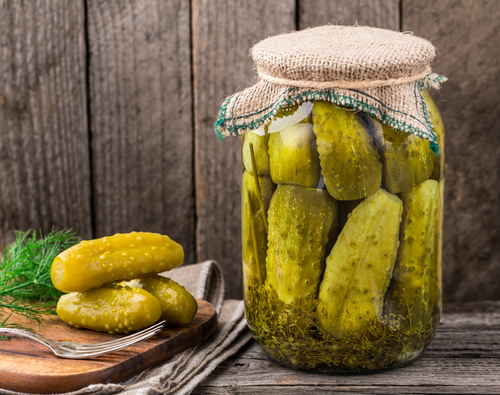Are Pickles Bad For You?
Also Known As: pickled cucumbers
Short answer
Pickling is an ancient process humans have used for thousands of years to preserve food. Other than the high sodium content of many pickle varieties, studies indicate pickles are not all that bad for you.
Recommended Alternative
Overall beneficial to your health. Things rated a 'B' may have some harmful qualities to pay attention to.
View Full Grading System
Category 'A'
Very healthy and numerous health benefits. Side effects are rare. Things rated an 'A+' are typically necessary for survival (for example, water).
Very healthy and numerous health benefits. A few harmful qualities may be associated, but only under certain circumstances such as an allergic reaction.
Very healthy and numerous health benefits. Harmful qualities may be associated, but aren't usually serious.
It is important to note that even the best things in life can become bad in immoderate amounts. So, although something may be rated an 'A+', overconsumption/overdoing can bring unwanted effects.
Category 'B'
Very beneficial to your health. Things rated a 'B+' may have a few harmful qualities to pay attention to.
Overall beneficial to your health. Things rated a 'B' may have some harmful qualities to pay attention to.
More beneficial to your health than not. However, harmful qualities are most likely associated and shouldn't be overlooked.
The main difference between category 'A' and category 'B' is the harmful qualities typically present in 'B' items. Serious side effects are usually uncommon, but are still possible and should be taken note of.
Category 'C'
Both beneficial and harmful qualities associated. Things rated a 'C+' are typically a bit more on the beneficial side. Still, moderation is important.
A fairly even ratio of beneficial and harmful qualities. Moderation is important. Very general topics that can lean towards both sides of the spectrum will be placed here as well. Rice, for example, can be good or bad depending on the type.
More harmful than beneficial. Side effects are common, especially when consumed/done excessively. Moderation is very important.
Category 'C' usually denotes to both good and bad qualities. When it comes to this category, it is important to keep this word in mind: moderation.
Category 'D'
Harmful to your health. Although benefits may be associated, the bad most likely outweighs the good. Moderation is very important.
Harmful to your health. A few benefits may be associated, but the bad outweighs the good. Moderation is extremely important.
Harmful to your health. Very few, if any, benefits are present. Things in this category should be avoided as much as possible.
Category 'D' is typically for things that are more harmful than beneficial. While consuming/doing something unhealthy once in a blue moon shouldn't hurt, we definitely recommend eliminating 'D' items as a regular part of your routine/diet.
Category 'F'
Category 'F' is for things that fail to bring anything beneficial to the table, and are very harmful to your health. We recommend completely avoiding anything in this category. Long-term side effects of 'F' items are usually very serious.
Category 'N'
'N' stands for neutral. Things placed into this category are generally (a) neither good nor bad for you, or (b) lack the necessary evidence to reach any conclusions.
Long answer
Pickles are cucumbers that endure an ancient process of preservation involving water, salt, and vinegar. This process is commonly known as pickling. This method of food preservation has been used for thousands of years. Pickling was used before refrigeration to preserve food long after growing season concluded. Pickled cucumbers are by far the most popular pickled food in North America, but in other parts of the world various fruits, vegetables, and in some cases meats are preserved in this manner.
The disadvantage to including pickles into your diet is the amount of sodium most pickles contain. The World Health Organization recommends limiting daily sodium intake to around 2,000 mg per day. A single serving of dill pickles has, on average, around 1,200 mg of sodium-- over half the recommended daily allotment! Anyone that has hypertension or blood pressure problems should only consume pickles in modest amounts. Additionally, high sodium diets have been linked to certain forms of stomach cancer.
Pickles have many benefits to the health of the human body as well. Because pickles are made from cucumbers, they are typically low in fat. Pickles are also rich in Vitamin K. Vitamin K helps the blood to clot in the case of injury. It should also be noted that fruits and vegetables help eliminate the presence of free radicals that lead to cell damage and cell mutations that can lead to cancer. Some pickles go through a natural fermentation process instead of a vinegar pickling process. Fermentation introduces probiotics, or good bacteria, into your digestive system, and breaks down food into a more digestible form while preserving nutritional value.
Possible short-term side effects
- diarrhea
- water retention
- nausea
- headache
Possible long-term side effects
- increased blood pressure
-
increased kidney workload
-
stomach cancer (unlikely)
Ingredients to be aware of
Benefits
- promotes digestive health
-
promotes weight loss
-
promotes liver protection
-
good source of vitamin k
Healthier alternatives
- low-sodium pickles
-
naturally fermented pickles
-
fresh cucumbers
Our Wellness Pick
(what is this?)
Bubbies Kosher Dill Pickles
- Authentic kosher dills
- Preservative-free
- Rich in probiotics
- Crisp and flavorful
- Convenient pack of 3
Learn More!
Please turn your Ad Blocker off to see this content. Thank you!
Thank you for your feedback!
Written by DeeAnne Oldham
Published on: 12-26-2015
Last updated: 12-15-2023
Thank you for your feedback!
Written by DeeAnne Oldham
Published on: 12-26-2015
Last updated: 12-15-2023

 Approved by
Approved by 















